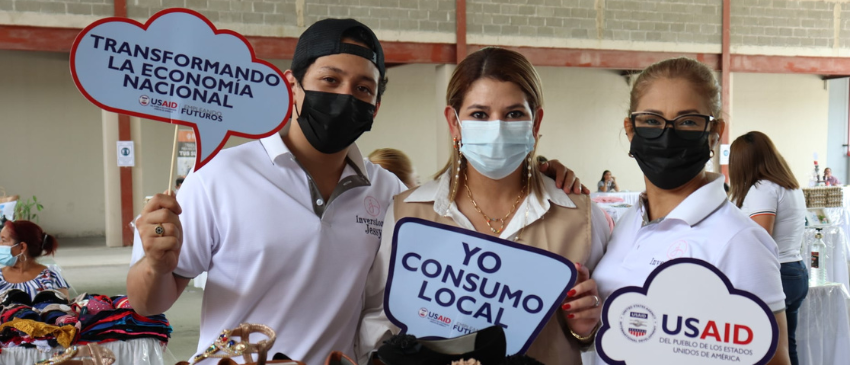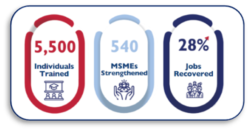
Innovation in Workforce Strengthening: Adapting to COVID-19 Challenges in Honduras
The COVID-19 pandemic had a dramatic impact on the Honduran economy. In a 2020 survey of 1,200 businesses across the country, 83 percent noted closing or partially closing operations during the first three months of the pandemic (March through May of 2020). At the same time it was estimated that over 500,000 kids would desert school due to the pandemic. The Honduran Secretary of Education was suddenly faced with the challenge of keeping students healthy and safe while transitioning to a virtual learning environment.
In response to the socio-economic disruption brought by COVID-19, Banyan Global led one of the country’s early-on economic recovery efforts and training for employment programs under the United States Agency for International Development (USAID) flagship workforce development activity, Empleando Futuros.
The recovery initiatives under Empleando Futuros were founded on strategic alliances across private sector actors and government ministries, leveraging more than $810,000 in additional investments. These alliances enabled Empleando Futuros to nimbly adapt its response to COVID-19 and support the country’s economic recovery in three important areas: business strengthening, virtual youth workforce and life skills building, and biosafety protocols.
Business Strengthening for Micro, Small and Medium Enterprises
As the COVID-19 pandemic disproportionately affected Micro, Small, and Medium Enterprises (MSMEs), Empleando Futuros co-designed a business strengthening training and coaching program to support their recovery. The project partnered with the Chambers of Commerce of Tegucigalpa, Choloma, and Cortés—as well as the Asociación Nacional de Industriales de Honduras (National Industrial Association) and the Business Development Center in the Lean Valley to provide tailored business and financial management support to the SME community.
 Hybrid (virtual and in-person) business strengthening support was provided to 540 MSMEs across the commerce, manufacturing, construction, technology, and service industries. The assistance included training and one-on-one business coaching that focused on improving business practices and employment recovery. Five thousand five hundred participants were trained, 60 percent of whom were women and 52 percent were between the ages of 16 and 30. At the close of the program, 702 jobs (28 percent) were recovered from total jobs lost since the onset of COVID-19, the majority in manufacturing, retail commerce, and services. To learn more about these efforts, read the Business Strengthening Learning Brief and Impact Brief.
Hybrid (virtual and in-person) business strengthening support was provided to 540 MSMEs across the commerce, manufacturing, construction, technology, and service industries. The assistance included training and one-on-one business coaching that focused on improving business practices and employment recovery. Five thousand five hundred participants were trained, 60 percent of whom were women and 52 percent were between the ages of 16 and 30. At the close of the program, 702 jobs (28 percent) were recovered from total jobs lost since the onset of COVID-19, the majority in manufacturing, retail commerce, and services. To learn more about these efforts, read the Business Strengthening Learning Brief and Impact Brief.
Secretary of Education Online Training for Employment Program
Due to lack of online education at the onset of the pandemic, the project identified the need to close the skill gap with work readiness skills to better prepare Honduran youth before they graduated. In partnership with the Honduran Secretary of Education, Empleando Futuros developed a virtual Training for Employment Program for youth. The program included certification in five competencies: biosafety, customer service, labor orientation, basic labor competencies, and life skills. Leveraging the Secretary of Education’s e-learning platform, more than 2,500 youth gained new technical and digital capacities with almost half obtaining employment or returning to school. Teachers and tutors were also introduced to virtual learning techniques, which strengthened critical learning methodologies for future institutional use.
Biosafety Protocols and Training
In the midst of the pandemic, Empleando Futuros collaborated with the public and private sector to develop nine online biosafety courses–the first of their kind in Honduras. Banyan Global developed the Return-to-School Biosafety Protocol and Course in collaboration with the Honduran Secretary of Education and other USAID education programs. Empleando Futuros worked with its partners to operationalize the Basic Biosafety Course, the Return-to-School Biosafety Protocol and Course, along with seven other industry-specialized biosafety courses across ten government and private sector platforms that reached more than 1 million Honduran citizens.
Host country capacity building and partnerships were central to Empleando Futuros activities. Resource materials were co-designed with host country organizations and produced in Spanish. The Empleando Futuros Legacy Report (available in English and Spanish) was compiled to share the results of the project. Additional resources from the project are available in the Empleando Futuros Digital Toolkit and on Banyan Global’s website.
